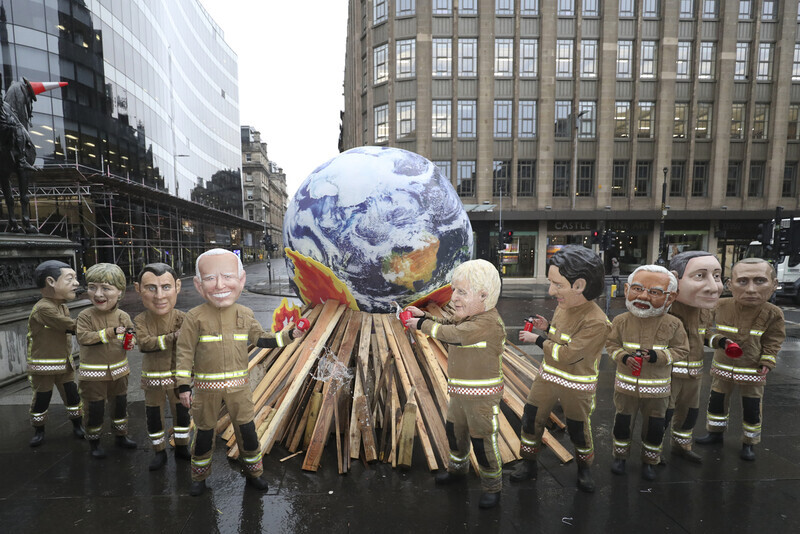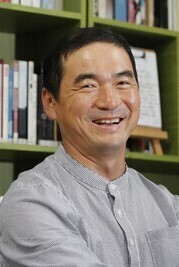hankyoreh
Links to other country sites 다른 나라 사이트 링크
[Column] With arms reductions, a green detent is possible

What issues pose the greatest threat to the future security of our planet and those who inhabit it? World-renowned UK physicist Stephen Hawking said on his 70th birthday on Jan. 8, 2012, that he thought a coming catastrophe — be it global warming or nuclear war — would wipe out human life within the next thousand years. A timeframe of less than a thousand years could mean either the distant future or the near future. It all depends upon what actions we take.
Many have lamented how sluggish humanity has been to act, including British Prime Minister Boris Johnson. “Humanity has long since run down the clock on climate change. It is one minute to midnight on that doomsday clock,” Johnson said during the opening ceremony of the 2021 UN Climate Change Conference, known as COP26, held in Glasgow in November last year.
The world prepares itself for a new Cold WarThough discussed with less urgency than climate change, the worldwide arms race, including that for nuclear weapons, is dramatically escalating as well. The five nuclear powers of the US, the UK, France, China and Russia are speeding up the modernization of their nuclear arsenal, and unofficial nuclear powers of Israel, India, Pakistan and North Korea are following suit.
Whether the Iran nuclear deal will be salvaged is still very much up in the air, and many different arms control deals are fading into the mists of history. Despite the COVID-19 pandemic and economic stagnation, military spending is skyrocketing across the world. Considering that arms races were one of the key features of the Cold War, it would not be an exaggeration to call today’s international order a new Cold War.
Lamenting this current state of affairs, over 50 Nobel Prize winners put forth “a simple proposal to humankind” called the Global Peace Dividend in December of 2021. Their proposition: countries around the world should decrease their military expenditure by 2% every year for five years and use half of the savings to combat “planetary emergencies” like infectious diseases, climate change and extreme poverty. Despite its simplicity and specificity, however, the proposal was unable to garner meaningful responses from the international community.
As a witness to such a reality, I thought of the “green detente.” The term was popularized in South Korea during the Lee Myung-bak and Park Geun-hye administrations. It encapsulated policies that aimed to defuse tension and foster peace on the Korean Peninsula through environmental cooperation including that for climate change. Inter-Korean forestry cooperation suggested by President Moon Jae-in is in a similar vein.
While I sympathize with its original meaning, I would like to offer a new definition of “green detente” from an alternative perspective. That is, the green detente can be the promotion of a virtuous cycle of measures against the climate crisis that lead to the diffusion of political and military tension around the world and vice versa through the reduction of military activity. This alternate definition stems from the following critical observations.
First, the climate crisis is the greatest communal security threat faced by every nation on the globe. US Secretary of Defense Lloyd Austin has said regarding this that the climate crisis is “a profoundly destabilizing force for the world,” labeling it an “existential threat” for US national security.
Second, military activity itself is a primary cause of climate change, yet awareness of this connection and responses taking it into consideration have been greatly lacking. Military activity around the world accounts for 5% to 6% of all greenhouse gas emissions, more than that of aviation (1.9%), marine transport (1.7%), rail (0.4%), and pipelines (0.3%) combined. In spite of this, the military sector acts as if it is on an entirely different planet. For example, although parties to the United Nations Framework Convention on Climate Change are required to report their annual greenhouse gas emissions, reporting emissions from the defense sector somehow still remains voluntary.
Third, a vicious cycle of military activity exacerbating climate change, which in turn gives rise to more military conflict and dispute, is becoming more and more apparent. As can be seen in Africa and the Middle East, extreme weather events have already become a key cause of military conflicts. One study even found that a 1-degree Celsius rise in temperatures lead to a 2.4% increase in interpersonal violence such as assault and murder and an 11.3% surge in intergroup conflicts such as riots and civil war.
Finally, despite strides in international cooperation related to climate change in the past few years, political and military tensions and arms races in and around the world have only intensified. For instance, the US and China, the two greatest carbon emitters and military spenders in the world, have continued with their excessive arms race despite pledging cooperation to counter the climate crisis, fueling climate change while squandering resources necessary to respond to it.
A military-shaped hole in climate responsesLike this, military activity continues to be treated as an exception when it comes to the climate crisis despite being its chief cause. The overwhelming force of climate change requires extraordinary political resolution, yet the political choices of many nations still heavily focus on arms buildups. Though more and more voices argue for action before the “window of opportunity” closes to counteract climate change, military activity around the globe is increasing day by day, putting out incredible amounts of carbon into the atmosphere daily.
Even though climate change is increasingly being considered a serious security threat for nations around the world, it continues to be exacerbated through heightened military activity — all in the name of national security. The green detente calls on nations to face this reality and establish arms reduction as a global agenda to help resolve the climate crisis and the new Cold War with insight.
While it is also a task for the globe to tackle, the green detente is also a challenge that should be urgently grappled with on the Korean Peninsula.
First of all, the Korean Peninsula is considered one of the most climate change-vulnerable regions in the world. For instance, while the global average temperature rose by 0.74 degrees Celsius in the past century, the average temperature in South and North Korea rose by a whopping 1.7 degrees and 1.9 degrees Celsius, respectively, in the same period.
Moreover, storms of the new Cold War are fast approaching the Korean Peninsula, where the effects of the old Cold War still linger. The possibility of armed conflict born out of the strategic competition between the US and China may force the two Koreas to choose allegiance and become involved in the clash. On top of that, the Korean Peninsula is already a region with some of the most military activity in the world, and improvements in inter-Korean relations and the initiation and continuation of a sustainable Korean Peninsula peace process is becoming all but impossible without advancements in the resolution of military problems.
This current reality calls for imagination and action that can transform misfortunes into blessings. By shifting the conversation to center on climate change, ideas and action plans can be generated to act as turning points in discussions on peace on the Korean Peninsula and how it should respond to the new Cold War that looms on the horizon. For this reason, I hope that the Korean Peninsula will be the region to kick-start the global agenda of the green detente.

By Cheong Wook-Sik, director of the Hankyoreh Peace Institute and director of the Peace Network
Please direct questions or comments to [english@hani.co.kr]

Editorial・opinion
![[Editorial] Yoon must halt procurement of SM-3 interceptor missiles [Editorial] Yoon must halt procurement of SM-3 interceptor missiles](https://flexible.img.hani.co.kr/flexible/normal/500/300/imgdb/child/2024/0501/17145495551605_1717145495195344.jpg) [Editorial] Yoon must halt procurement of SM-3 interceptor missiles
[Editorial] Yoon must halt procurement of SM-3 interceptor missiles![[Guest essay] Maybe Korea’s rapid population decline is an opportunity, not a crisis [Guest essay] Maybe Korea’s rapid population decline is an opportunity, not a crisis](https://flexible.img.hani.co.kr/flexible/normal/500/300/imgdb/original/2024/0430/9417144634983596.jpg) [Guest essay] Maybe Korea’s rapid population decline is an opportunity, not a crisis
[Guest essay] Maybe Korea’s rapid population decline is an opportunity, not a crisis- [Column] Can Yoon steer diplomacy with Russia, China back on track?
- [Column] Season 2 of special prosecutor probe may be coming to Korea soon
- [Column] Park Geun-hye déjà vu in Yoon Suk-yeol
- [Editorial] New weight of N. Korea’s nuclear threats makes dialogue all the more urgent
- [Guest essay] The real reason Korea’s new right wants to dub Rhee a founding father
- [Column] ‘Choson’: Is it time we start referring to N. Korea in its own terms?
- [Editorial] Japan’s rewriting of history with Korea has gone too far
- [Column] The president’s questionable capacity for dialogue
Most viewed articles
- 1Months and months of overdue wages are pushing migrant workers in Korea into debt
- 2Trump asks why US would defend Korea, hints at hiking Seoul’s defense cost burden
- 3At heart of West’s handwringing over Chinese ‘overcapacity,’ a battle to lead key future industries
- 4[Editorial] Yoon must halt procurement of SM-3 interceptor missiles
- 5Fruitless Yoon-Lee summit inflames partisan tensions in Korea
- 61 in 3 S. Korean security experts support nuclear armament, CSIS finds
- 7Dermatology, plastic surgery drove record medical tourism to Korea in 2023
- 8AI is catching up with humans at a ‘shocking’ rate
- 9First meeting between Yoon, Lee in 2 years ends without compromise or agreement
- 10Amnesty notes ‘erosion’ of freedom of expression in Korea in annual human rights report